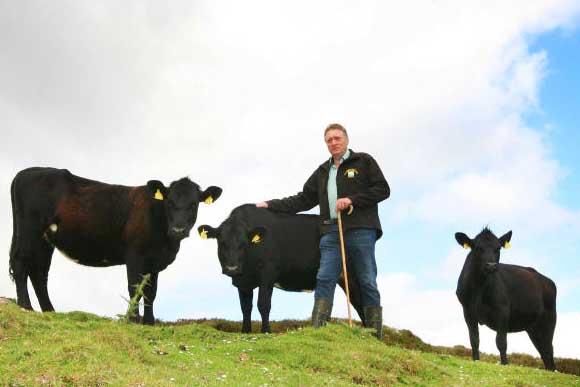The Irish Natura and Hill Farmers Association (INHFA) has hit out at demands made by the Irish Wildlife Trust (IWT) for the destocking of upland areas.
Last week, the IWT called for sheep to be taken off the hills to “allow restoration of upland and peatland ecosystems” following the publication of a study on the Nephin/Owenduff Complex Special Protection Area in Mayo by the National Parks and Wildlife Service (NPWS).
INHFA president Colm O’Donnell said destocking the hills over 20 years ago was still a raw issue for many farmers and any proposal to revisit it would not be entertained.
If the IWT and other environmentalists need to blame someone then turn your ire to the NPWS
Failure
“It has not only failed our farmers but also failed in its intention to deliver better environmental outcomes on our hills. On the Burren we also saw how the removal of stock had a negative environmental impact, but thankfully the mistake was acknowledged in time and stock were reintroduced,” he stated.
In the IWT’s rush to blame farmers, O’Donnell said it was unfortunate they did not take time to “look beyond their own prejudices to see the bigger picture”.
He added: “Our hills are managed landscapes. This is something members of the IWT and others need to understand. The problem is not our farmers, the problem is the restrictions these farmers have to work under.”
Restrictions
Under Natura 2000, large areas of land were designated as special areas of conservation (SAC) and special protected areas (SPA). O’Donnell said the sites were designed due to their good environmental standing, which was delivered by farmers’ management practises.
He said were now being blamed for a deterioration in these sites over the last 20 years.
“There is understandable anger by many farmers at the way they have been treated over the last twenty years. Despite delivering habitats of exceptional value worth protecting, they are rewarded with restrictions that have sterilised their land and undermined these habitats.
“Through these restrictions they have lost income and seen the value of their land fall. Their freedom to farm is limited through the 39 actions requiring consent with additional costs loaded on to farmers through these 39 actions,” O'Donnell said.
NPWS
O’Donnell levelled the blame at the National Parks and Wildlife Service (NPWS) saying the regression was as a result of the 39 actions requiring consent.
“If the IWT and other environmentalists need to blame someone then turn your ire to the NPWS, because it is the NPWS who didn’t and still haven’t put in place any management plans for these sites.”
The NPWS had failed to work with farmers and provide advice based on fact, O’Donnell stated.
“We are the professionals so maybe it is time for the amateurs to leave the field,” he concluded.
Read more
New land designations will have major implications – INHFA
Calleary called on to continue farm payment convergence
The Irish Natura and Hill Farmers Association (INHFA) has hit out at demands made by the Irish Wildlife Trust (IWT) for the destocking of upland areas.
Last week, the IWT called for sheep to be taken off the hills to “allow restoration of upland and peatland ecosystems” following the publication of a study on the Nephin/Owenduff Complex Special Protection Area in Mayo by the National Parks and Wildlife Service (NPWS).
INHFA president Colm O’Donnell said destocking the hills over 20 years ago was still a raw issue for many farmers and any proposal to revisit it would not be entertained.
If the IWT and other environmentalists need to blame someone then turn your ire to the NPWS
Failure
“It has not only failed our farmers but also failed in its intention to deliver better environmental outcomes on our hills. On the Burren we also saw how the removal of stock had a negative environmental impact, but thankfully the mistake was acknowledged in time and stock were reintroduced,” he stated.
In the IWT’s rush to blame farmers, O’Donnell said it was unfortunate they did not take time to “look beyond their own prejudices to see the bigger picture”.
He added: “Our hills are managed landscapes. This is something members of the IWT and others need to understand. The problem is not our farmers, the problem is the restrictions these farmers have to work under.”
Restrictions
Under Natura 2000, large areas of land were designated as special areas of conservation (SAC) and special protected areas (SPA). O’Donnell said the sites were designed due to their good environmental standing, which was delivered by farmers’ management practises.
He said were now being blamed for a deterioration in these sites over the last 20 years.
“There is understandable anger by many farmers at the way they have been treated over the last twenty years. Despite delivering habitats of exceptional value worth protecting, they are rewarded with restrictions that have sterilised their land and undermined these habitats.
“Through these restrictions they have lost income and seen the value of their land fall. Their freedom to farm is limited through the 39 actions requiring consent with additional costs loaded on to farmers through these 39 actions,” O'Donnell said.
NPWS
O’Donnell levelled the blame at the National Parks and Wildlife Service (NPWS) saying the regression was as a result of the 39 actions requiring consent.
“If the IWT and other environmentalists need to blame someone then turn your ire to the NPWS, because it is the NPWS who didn’t and still haven’t put in place any management plans for these sites.”
The NPWS had failed to work with farmers and provide advice based on fact, O’Donnell stated.
“We are the professionals so maybe it is time for the amateurs to leave the field,” he concluded.
Read more
New land designations will have major implications – INHFA
Calleary called on to continue farm payment convergence







 This is a subscriber-only article
This is a subscriber-only article










SHARING OPTIONS: